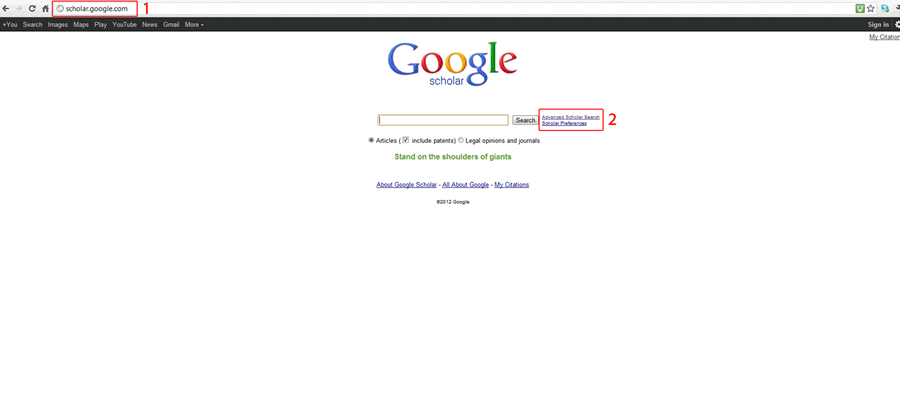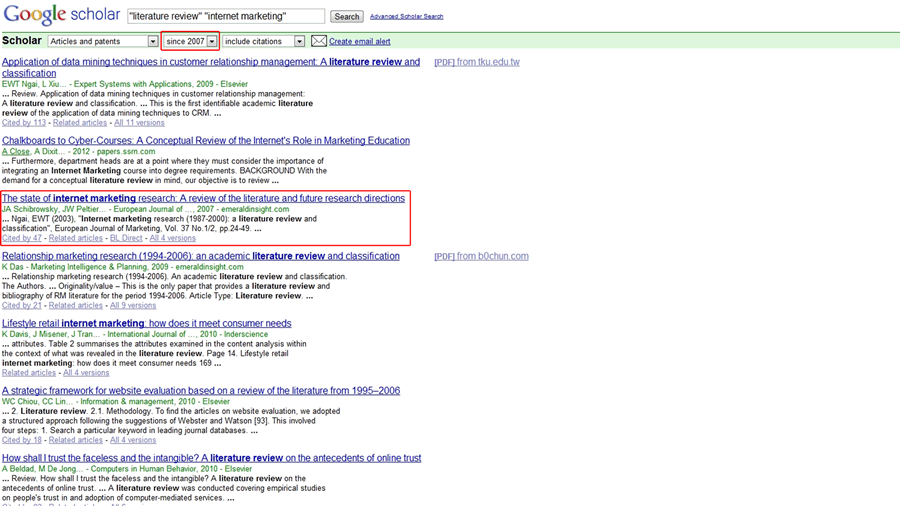CONSIDERATION TWO:
Using review articles to understand the broader literature quickly
Every now and again journals publish review articles or literature reviews on specific sub-field (e.g., Internet marketing, market entry, human capital, knowledge transfer, etc.). Whilst the style of these articles varies, they tend to be great for a number of reasons: (a) they don't just summarize the literature on a given topic, but they also critique it; (b) the reference list at the end of the article is a useful starting point to do further research; and (c) they are a great way to quickly get your head around the literature. You can look to books instead of review articles in journals, but you may find that there are far fewer books that are specific enough to capture the topic you're interested in.
In order to show you how to do this, we use Google Scholar because it is very effective at building a list that draws on your sub-fields (e.g., Internet marketing) and other important criteria, such as the journal publication date. To start the process, look at the image below [NOTE: we have highlighted the points to look at in red]:

The numbers in red in the image above match those below. Therefore, to start the process:
Go to Google Scholar (see: http://scholar.google.com/)
Click on the Advanced Scholar Search link.
In the diagram below, we have highlighted the parts of Google Scholar you need to consider next [NOTE: we have highlighted these parts in red]:

The numbers in red in the image above match the steps below. Therefore, to start the process:
Enter the name of the sub-field (i.e., area of the literature) you are interested in within the with the exact phrase search box in the Find articles section. For the purposes of this example, let's imagine your dissertation is on the role of Internet marketing in influencing the purchasing behaviour of children. There are two good starting points in the literature: Internet marketing and purchasing behaviour. Therefore, let's start with "Internet marketing", by entering this into the search both, using double quotation marks (i.e., "..."), which ensures that Google Scholar looks for both these words together (i.e., Internet marketing, not Internet and marketing separately). Also, since we are interested in review articles, add either of the following search terms to the search box: "literature review" or "meta-analysis".
In the drop-down box for where my words occur in the Find articles section, do not change the drop down from anywhere in the article, which is the default option. You can select the second drop down, in the title of the article, but this may minimise your search results too much at this stage.
In the Date section, we recommend starting with the most recent year (e.g., in our example, we entered 2012 as the publication date, which will return all articles published during and after 2012). However, unless you're lucky, you are unlikely to find such a recent review article. Therefore, we recommend moving the publication date back year-by-year. The further you go back, the more likely that new research has been published since your review article was published, but it's still worth doing this because review articles can be so helpful. We had to go back to 2007 in our example to find a potential review article for Internet marketing. As a general rule, 4-5 years is probably as far as you'll want to go back before the literature being reviewed becomes too outdated, but this could be as little as 1-2 years in certain fields and subject areas. Remember that an article that has been published within the last 2-3 years could actually reflect research that was conducted 4.5 to 6 years ago; perhaps longer. Before journal articles are published, researchers spend significant time collecting data, analysing the data and writing up, before often taking these findings to conferences to get the opinions of other academics, before submitting a manuscript for consideration at a journal. This final consideration process can take between 3 months and 2 years before the article is peer-reviewed and published in a journal. Review articles are no different. Therefore, review articles that have been recently published (i.e., in the last 6-18 months) are more likely to reflect more recent research (i.e., conducted in the last 2 to 3.5 years).
You could also select the Search only articles in the following subject areas radio box in the Collections section, if you want to narrow down your search to specific subject areas. In our example, we would select the Business, Administration, Finance, and Economics tick box (i.e., because Internet marketing is generally associated with subjects such as Business). Again, this is another choice you will have to make, but we would suggest not selecting this box at this point in order to keep the search results a little broader. After all, you'll find that academics across a wide range of degrees (e.g., Management, Social Sciences, Psychology, Sports Science, Engineering, etc.) publish review articles that may be traditionally studied in just one major degree (e.g., the subject, Marketing, in the degree, Management). Therefore, we prefer not to narrow down the search to subject areas at this time.
Finally, click the Search Scholar button.
Below is the first part of the list of articles returned for our search:

As usually, the search results will return books, conference papers, or theses or dissertations, but we would suggest only looking for journal articles, ideally in high quality journals. If you are unsure which journals are of a high quality in your subject area, your supervisor should know. If you find that there are no review articles in the last 4-5 years, perhaps because you're investigating a particular new or novel phenomenon, you'll have to consider either going back further or looking for books that may summarize the sub-fields you are interested in.
From the results of our search, we can see that just one journal article is relevant, and we had to move the publication date back to 2007. This article was titles: The state of Internet marketing research: A review of the literature and future research directions, published in the European Journal of Marketing. However, we only need one high quality review for each of the main sub-fields we are interested in article to help us as this stage (i.e., in our case, just two sub-fields: Internet marketing and purchasing behaviour because of example dissertation was on the role of Internet marketing in influencing the purchasing behaviour of children).
As a general point, your university may have paid to get access to these review articles, but if not, paying for an individual article may be worth it in this instance because of the high value of review articles. However, if you need to rely on your university access, and such review articles are not available, consider using books and theses/dissertations rather than journal articles if you have access to the former.